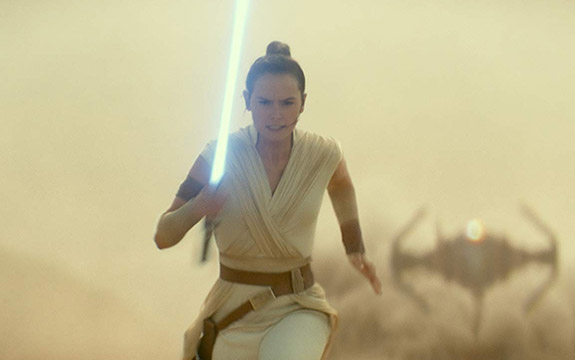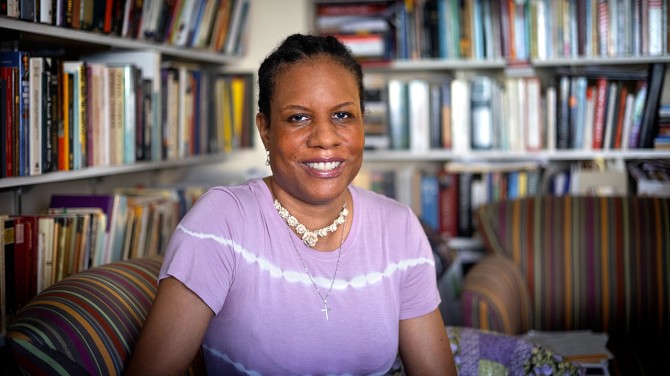
The generations of Star Wars illuminate our current cinema, franchise-making, and the myth of nostalgia | Image credit: Lucasfilm LTD. Via AP
In summary
- Analysis for University of Minnesota Press by Dr Dan Golding, Swinburne University of Technology
I have seen these words twice in my lifetime. The first time, I was twelve years old and downloading the first teaser trailer for Star Wars: Episode I – The Phantom Menace on a 56k dial-up modem in rural Australia. These were the early days of the internet. The idea of a trailer as an event, and the practice of streaming video were both just beginning to take hold. I watched with awe at literally every frame for this new film: every ten minutes or so I would have a new five-second section to contemplate. I scrubbed through them with the arrow keys of my prehistoric desktop computer, my eyes only inches from the screen. Darth Maul drawing his lightsaber. Gungans in the mist. A new Jedi order.
The second time I saw these words was on April 12, 2019. I was thirty-two and live-streaming a panel from the other side of the world as the first purrs of a weapons-grade marketing campaign for Star Wars: Episode IX – The Rise of Skywalker came sputtering to life. In a year of enormous, culture-defining blockbusters, this would surely be one of the biggest. The ‘saga’ was coming to an end; a new caretaker in the forms of Disney and Lucasfilm president Kathleen Kennedy would shepherd the Skywalkers towards a final full-stop.
The story of the twenty years between The Phantom Menace and The Rise of Skywalker – filled with six ‘saga’ films, two anthology films, three animated television series, two in-production live-action series, uncountable characters and actors, and the biggest transition in the franchise’s history from the outsider millionaire George Lucas to the insider corporation of Disney – is too big to be told. How do you encapsulate the white-hot rage that George Lucas and his prequels faced for Jar Jar Binks, midichlorians, and the adolescent pouting of the man who was supposed to become Darth Vader? How do you explain away the Mickey Mouse jokes that greeted the sale of Lucasfilm to Disney, or the fears that Star Wars would become an all-singing, bland sell-out? How can we begin to understand the apocalyptic hatred that actors Kelly Marie Tran (Rose from The Last Jedi) and Ahmed Best (Jar Jar Binks from the prequels) were on the receiving end of, and then, unbelievably, the rapturous standing ovations and sports-like chants of support they both received that same weekend in April, 2019, as Star Wars fans welcomed them like long-lost relatives?
“Every generation has a legend.” This is a marketing line with bite, and if anything can tell us about this almost unfathomable moment in pop culture, it’s this. The generations of Star Wars illuminate our current cinema, franchise-making, and the self-made myth of nostalgia.
Nostalgia’s pull has multiplied in our times because media augments memory. When we watch an old film, in some part we grasp at who we were when we saw it for the first time. This is of course an impossibility: we cannot time travel or grow younger, and so nostalgia provides us with a kind of impossible homecoming, a return to a place that we can never really go to. When Rogue One’s costumers went to remake the 1977-era Stormtrooper for 2016, they found that the grills on the side of their helmets had to be built in – the cheap stickers that looked fine on ’70s Panavision filmstock would today not live up to memory’s rosy recollection. Fans can never return to the moment they fell in love with Star Wars for the first time, but Han Solo can return to the Millennium Falcon: Chewie, we’re home.
Indeed, the greatest trick of the sequel trilogy – this new Disney era – has been to displace fans’ own awe and thirst for a nostalgic return into the mythology of the films themselves. By the time of The Force Awakens, Luke Skywalker has become myth. The Jedi, the force, the Empire, these are all distant memories spoken of in disbelieving tones: our new heroes mirror our own watery-eyed shock at reencountering them again, as if our memories have taken on corporeal form. It’s true, we’re told. All of it.
Star Wars generations are identified, created, mythologized. Göran Bolin argues that nostalgia is at the root of generational gaps, often appearing between parents and children through insurmountable differences in their respective media landscapes. Adults hated the prequels in 1999, but those who grew up with them now use them to signal their own yearning for youth. The secret, for Disney, has been in simultaneously addressing three generations: first, in authorizing a return to the ‘home’ of the original trilogy for older fans; second, in not alienating the prequel kids; and finally, in opening up enough points of entry to galvanize a generation of newcomers, for whom the stories of Star Wars were for other people.
With nostalgia, with ageing generations, also comes legacy. The next best thing to an actual return to youth is the passing on of experience, and knowledge, and passion. Parents pass Star Wars on to their children, and now, the films do it too. Carrie Fisher, in her memoirs, The Princess Diarist, keenly observes this point through her years of interacting with Star Wars fans. She notes how Star Wars fans have a “common language that runs from five to eighty-five,” that is deliberately and almost ritualistically cultivated by parents in their children. Do you show your kids A New Hope or The Phantom Menace first, you ask?
Every generation, we’re told, has a legend. And now, with the sequel era of Star Wars, with The Force Awakens, The Last Jedi, and The Rise of Skywalker, another generation, another legend, is not so much born as it is actively cultivated by a megacorporation that will be here long after all of us. Like all other generations, it too will inevitably be remembered, mythologised, and ultimately, passed on.
This article was originally written for University of Minnesota Press to coincide with the release of Dr Dan Golding’s book Star Wars After Lucas.








